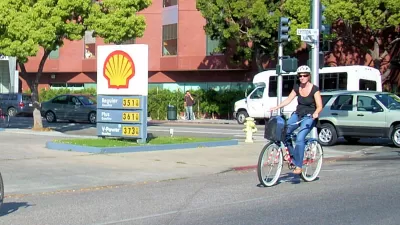Opposition is stirring in industry and within the California legislature over the inclusion of oil refineries* in the cap and trade program come Jan. 1. Warning of a new tax on gas, opponents hope to delay the requirement for transportation fuels.
(*Updated 07/11/2014) Calling it the "new gas tax," a "bipartisan group of local lawmakers are joining business groups in a campaign" to oppose the inclusion of transportation fuels in California's successful cap and trade program as "they say will lead to higher gas and goods costs for consumers," writes Neil Nisperos of the Inland Valley Daily Bulletin.
“If this goes through as planned, in places like the Valley and other communities where money’s tight, another 15 cents a gallon?” said Henry Perea, the (Democrat) Fresno assemblyman who wrote a letter signed by 16 Democrats this month to Mary Nichols, chairwoman of the California Air Resources Board (CARB), writes Dave Siders in the Sacramento Bee.
Perea "introduced legislation through Assembly Bill (AB) 69, which would delay putting fuels under the cap-and-trade program until January 1, 2018," according to his press release. [Technical note: this is known as a "gut and amend" as he amended an existing bill rather than draft a new bill.]
Authorized by the state's landmark climate change law, AB 32 in 2006, and approved by CARB in 2011, it took effect in 2012, primarily with power plants and other large industrial emitters which purchased emission allowances when necessary. On January 1, oil refineries* [ed: see correction below] will enter the program—and that has many state legislators of both parties concerned that gas prices could be raised steeply.
The lawmakers and industry opponents are being supported through an online campaign at www.tankthetax.com.
"It sounds like in an election year everyone is looking for some political cover on tough issues," said Robin Swanson, a Democratic political consultant. "If gas prices go up in the summer, no one wants to be held accountable for that; no one wants to be left holding that bag," writes Siders.
Senate leader Darrell Steinberg had hoped to add a carbon tax to gasoline in lieu of placing transportation fuels under cap and trade as we noted previously, but he dropped that effort. "In essence, the decision (was) whether to charge consumers at the pump or have refineries participate in a carbon auction, and pass on the added costs to consumers."
How revenues from cap and trade would be spent was determined in the state's new budget, posted here. While high speed rail captured much media attention, transit and affordable housing were big winners as well. If opponents succeed, that budget will likely have to be revised.
Finally, the largest source (40%) of carbon emissions in California is from transportation. Not having transportation fuels included in the cap and trade program would jeopardize the goal of AB 32—to reduce carbon emissions to 1990 levels by 2020.
*Correction per Air Resources Board: "Oil refineries have been under cap-and-trade since compliance began in 2013. On January 1, 2015, suppliers of transportation fuel and natural gas come into the program. These are operations which distribute fuel."
*Correction: Another paragraph was removed that erroneously attributed claims to CARB spokesperson Dave Clegern.
FULL STORY: California lawmakers, industry groups join to oppose ‘gas tax’ in emissions cap program

Maui's Vacation Rental Debate Turns Ugly
Verbal attacks, misinformation campaigns and fistfights plague a high-stakes debate to convert thousands of vacation rentals into long-term housing.

Planetizen Federal Action Tracker
A weekly monitor of how Trump’s orders and actions are impacting planners and planning in America.

Chicago’s Ghost Rails
Just beneath the surface of the modern city lie the remnants of its expansive early 20th-century streetcar system.

Bend, Oregon Zoning Reforms Prioritize Small-Scale Housing
The city altered its zoning code to allow multi-family housing and eliminated parking mandates citywide.

Amtrak Cutting Jobs, Funding to High-Speed Rail
The agency plans to cut 10 percent of its workforce and has confirmed it will not fund new high-speed rail projects.

LA Denies Basic Services to Unhoused Residents
The city has repeatedly failed to respond to requests for trash pickup at encampment sites, and eliminated a program that provided mobile showers and toilets.
Urban Design for Planners 1: Software Tools
This six-course series explores essential urban design concepts using open source software and equips planners with the tools they need to participate fully in the urban design process.
Planning for Universal Design
Learn the tools for implementing Universal Design in planning regulations.
planning NEXT
Appalachian Highlands Housing Partners
Mpact (founded as Rail~Volution)
City of Camden Redevelopment Agency
City of Astoria
City of Portland
City of Laramie



























